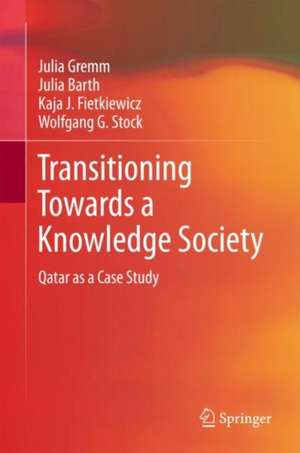Transitioning Towards a Knowledge Society: Qatar as a Case Study
Autor Julia Gremm, Julia Barth, Kaja J. Fietkiewicz, Wolfgang G. Stocken Limba Engleză Hardback – 21 dec 2017
| Toate formatele și edițiile | Preț | Express |
|---|---|---|
| Paperback (1) | 503.45 lei 38-44 zile | |
| Springer International Publishing – 4 sep 2018 | 503.45 lei 38-44 zile | |
| Hardback (1) | 588.50 lei 43-57 zile | |
| Springer International Publishing – 21 dec 2017 | 588.50 lei 43-57 zile |
Preț: 588.50 lei
Preț vechi: 692.36 lei
-15% Nou
Puncte Express: 883
Preț estimativ în valută:
112.61€ • 117.87$ • 93.73£
112.61€ • 117.87$ • 93.73£
Carte tipărită la comandă
Livrare economică 31 martie-14 aprilie
Preluare comenzi: 021 569.72.76
Specificații
ISBN-13: 9783319711942
ISBN-10: 3319711946
Pagini: 204
Ilustrații: XVII, 244 p. 77 illus., 74 illus. in color.
Dimensiuni: 155 x 235 x 18 mm
Greutate: 0.54 kg
Ediția:1st ed. 2018
Editura: Springer International Publishing
Colecția Springer
Locul publicării:Cham, Switzerland
ISBN-10: 3319711946
Pagini: 204
Ilustrații: XVII, 244 p. 77 illus., 74 illus. in color.
Dimensiuni: 155 x 235 x 18 mm
Greutate: 0.54 kg
Ediția:1st ed. 2018
Editura: Springer International Publishing
Colecția Springer
Locul publicării:Cham, Switzerland
Cuprins
Part 1: Context.- Chapter 1. Informational Cities in the GCC States.- Chapter 2. Qatar in a Nutshell.- Part 2: Concept.- Chapter 3. Knowledge Economy and Knowledge-Based Development.- Chapter 4. Methods.- Part 3: Connection.- Chapter 5. Diversification of Knowledge-Based Industries and Foreign Investment.- Chapter 6. Creativity and the Knowledge Society.- Chapter 7. E-Government.- Chapter 8. Knowledge-Based Development.- Chapter 9. Universities and other Institutions of Higher Education.- Chapter 10. Students and Graduates.- Chapter 11. Transition of Graduates into the Labor Market.- Chapter 12. Libraries, Science Parks and Research Funding.- Part 4: Conclusion.- Chapter 13. Strengths, Weaknesses, Opportunities and Threats of Qatar’s Way into the Knowledge Society.- Index.
Notă biografică
Wolfgang G. Stock is full professor and head of the Information Science Dept. of Heinrich Heine University Düsseldorf, Germany. His research areas include studies on smart cities, social network services and information behavior. He is author of about 300 articles and books, thereof about 30 are on prototypical cities of the emerging knowledge society.
Kaja J. Fietkiewicz is research associate at Heinrich Heine University Düsseldorf. She is working on Social Media and on Smart Cities, especially in Japan.
Julia Barth and Julia Gremm have been assistant lecturers for Smart City Research at Heinrich Heine University Düsseldorf. They conducted field researches on cities in the Gulf Region (especially, in Kuwait, Qatar, U.A.E. and Oman) and published articles on the “Arabian Way” into knowledge society.
Kaja J. Fietkiewicz is research associate at Heinrich Heine University Düsseldorf. She is working on Social Media and on Smart Cities, especially in Japan.
Julia Barth and Julia Gremm have been assistant lecturers for Smart City Research at Heinrich Heine University Düsseldorf. They conducted field researches on cities in the Gulf Region (especially, in Kuwait, Qatar, U.A.E. and Oman) and published articles on the “Arabian Way” into knowledge society.
Textul de pe ultima copertă
The book offers a critical evaluation of Qatar’s path from oil- and gas-based industries to a knowledge-based economy. This book gives basic information about the region and the country, including the geographic and demographic data, the culture, the politics and the economy, the health care conditions and the education system. It introduces the concepts of knowledge society and knowledge-based development and adds factual details about Qatar by interpreting indicators of the development status. Subsequently, the research methods that underlie the study are described, which offers information on the eGovernment study analyzing the government-citizen relationship, higher education institutions and systems, its students and the students’ way into the labor market. This book has an audience with economists, sociologists, political scientists, geographers, information scientists and other researchers on the knowledge society, but also all researchers and practitioners interested in the Arab Oil States and their future.
Caracteristici
This is the first book to cover an understanding of an Arab oil state’s way into becoming a knowledge society Discusses Qatar as a paradigm for other states encountering this knowledge society shift Concisely analyzes programs to configure knowledge society and – in contrast to the programs – the reality of the way into knowledge society Includes supplementary material: sn.pub/extras
